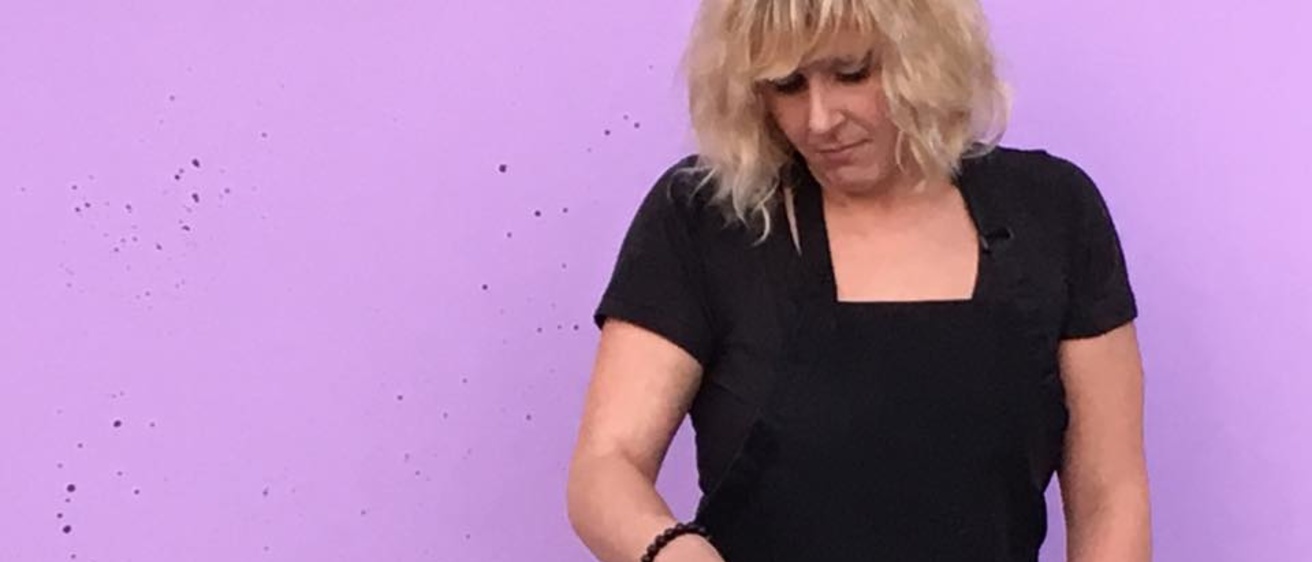Wax guns, duck decoys, and nail polish. These are some of the items in artist Jessica Pleyel’s community engagement toolkit. The Obermann Graduate Institute alumna is currently bringing audiences together to consider gun violence against women, especially by domestic partners. Her exhibition, To(get)her: Meeting/Melting/Mending, had a month-long run at the Des Moines Social Club this spring, and last summer, Pleyel was the inaugural artist-in-residence at Tacoma, Washington’s FEAST Art Center. In addition, Pleyel has shown To(get)her twice in Iowa City.
Food and Nail Polish

In each instance, the artwork is created by a group of women, most of them strangers to each other and even to Pleyel. The artist hosts a home-cooked meal—sometimes using one of her grandmother's Cajun recipes. Over food and the intimate but lighthearted act of painting each other’s nails, the women start to talk, often sharing stories of violence they have experienced as survivors or as allies.
Next, they get down to the business of creating art. Pleyel, who earned an MFA with an emphasis on sculpture and a certificate in Gender, Women’s & Sexuality Studies in May 2017, creates wax assault rifles prior to the gathering. She then invites the participants to melt them with domestic tools, such as hair dryers, irons, and waffle irons. The melted objects become artifacts that live on in the gallery space for the ensuing exhibition.
Numbers Matter

It takes Pleyel 16 hours to pour and cure a wax rifle using her own handmade silicon molds. She finds it relevant that every 16 hours, a woman in the United States is shot and killed by her partner. She has created as many as 61 guns for a single exhibit/experience. In the gallery space, she also displays photographs of the 138 U.S. representatives who voted against the 2013 Violence Against Women’s Reauthorization Act. Although the act was signed into law, it is unclear whether the current administration will enforce it. Pleyel has letter templates at her events so that attendees can write to their legislators to encourage them to support the Act.
Mending Starts at Home

Mending relationships and building community is central to Pleyel's artwork, whether it involves communities of women who become friends over the course of an evening, or her own father. “For years, my father and I have struggled to communicate,” Pleyel has written. “In an effort to mend our relationship, we began carving decoys. These objects became both literal and metaphoric decoys—not only were we making these to lure ducks closer while hunting, but we were also using them as decoys for conversation, discussion, and to bring us closer.”
That kind of intimacy and intention for safe space runs throughout Pleyel’s work, which combines the domestic and the political. “As an activist and survivor, much of my practice is creating safe spaces for victims and survivors of domestic violence and sexual assault to share, ignite, and create discussions,” she says. “I have often felt there was not a space for me to voice the many emotions that come with my experience."
We Are Survivors
In spring 2016, Pleyel curated an exhibition at Iowa City's PS1. We Are Survivors featured 16 artists from across the country (yes, the number was intentional!) who were exploring their own understandings of sexual assault. In the future, she looks forward to longer residencies that will allow her to work with local survivors and support organizations to develop collaborations based on trust.
“Change happens in varying degrees,” notes Pleyel. “When we come together and our voices are in unison, we are empowered to create community, discussion, and change.”
